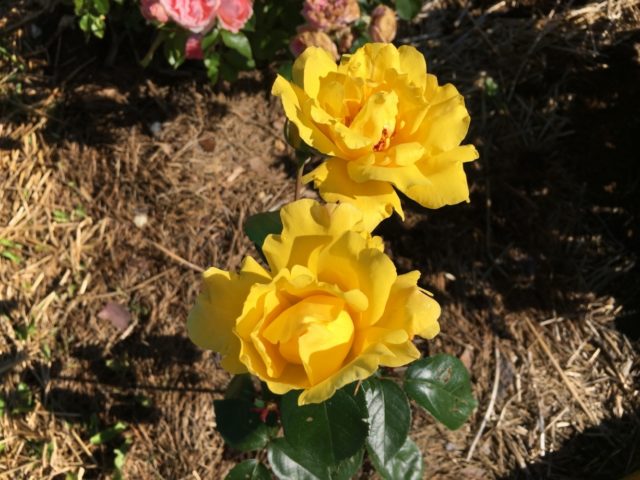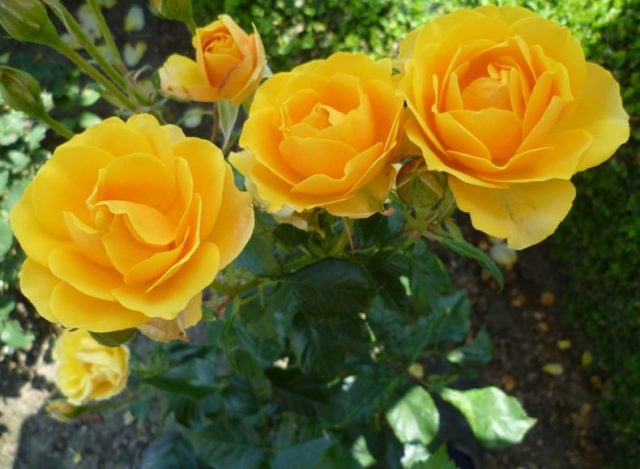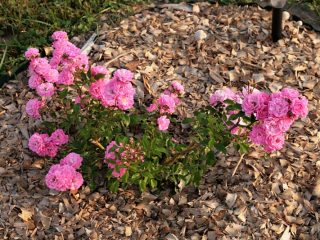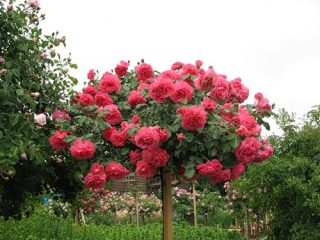Content
- 1 History of selection
- 2 Description of the floribunda rose variety Golden Dreams and characteristics
- 3 Advantages and disadvantages of the variety
- 4 Reproduction methods
- 5 Planting and caring for floribunda rose Golden Dreams
- 6 Pests and diseases
- 7 Application in landscape design
- 8 Conclusion
- 9 Reviews with photos about rose floribunda Golden Dreams
Rose floribunda Golden Dreams is a variety of delicate pastel shades, coupled with high immunity and good frost resistance. Flowers of this variety are distinguished by their decorativeness and splendor of inflorescences. This is not surprising, because the name of this family “floribunda” can be translated as “abundantly blooming”.
History of selection
Back at the beginning of the 20th century, breeders actively crossed ornamental and wild varieties of roses, trying to create a species that was not only attractive in appearance, but also the least demanding in terms of cultivation and care. The fashion for roses prompted botanists to undertake a variety of experiments, the results of which were new original varieties.
The authorship of the first variety of floribunda is attributed to two breeders: the Dane Svend Poulsen and the German Peter Lambert. The majority of votes are in favor of the Dane, since it was Poulsen who in 1924 introduced floribunda roses, bred by crossing polyanthus and hybrid tea varieties.

As an “inheritance” from each of the parents, “Golden Dreams” received a beautiful palette of shades, frost resistance and excellent immunity
The authorship of the most famous floribunda varieties belongs to the American breeder Eugene Berner. He also introduced into use the name of the floribunda family, which was then distributed by the Jackson and Perkins company, specializing in the sale of garden and indoor plants.
One of the representatives of the floribunda family is the Golden Dreams roses. They were bred in one of Poulsen's nurseries in 1998.
Description of the floribunda rose variety Golden Dreams and characteristics
These are low, lush multi-flowered roses that do not stop blooming throughout the summer season. The average height of the bush is from 80 to 110 cm. The flowers are double and semi-double. Several are located on the inflorescences of the brush. The diameter does not exceed 6-8 cm.
The shade of the Golden Dreams variety is yellow. Color may vary depending on the lighting of the area. Sometimes a slight orange or pinkish tint is visible. It “frames” the petals or, conversely, emphasizes the base of the flower. The leaf blades are green, smooth, with a shiny dorsal surface, without plaque.
The bush is medium spreading. Capable of growing up to 60-70 cm in width. Suitable for both growing in the garden, for example, in a rose garden or decorative flower beds, and for cultivation at home. Golden Dreams roses are often planted in pots and containers and used to decorate summer terraces and verandas.
Variety type – repeat flowering.This means that this variety will delight gardeners with bright flowers of sunny apricot color throughout the warm season. Roses have a light, delicate aroma and look great not only in the landscape, but also as a cut flower. Floribunda "Golden Dreams" is aesthetically pleasing both in buds and in its loose state.
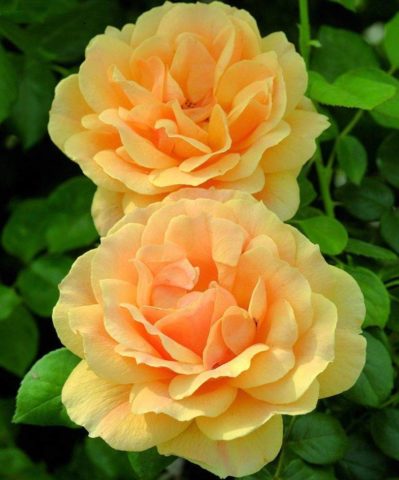
The shade of roses varies from apricot to yellow-pink
"Golden Dreams" have high immunity to many diseases, thanks to the parent tea hybrid. They show poor resistance to black spot and powdery mildew. However, this does not mean that you need to neglect the prevention of other diseases and completely exclude insecticidal treatment of varieties from agricultural technology.
Almost all floribunda roses have good winter hardiness. The variety "Golden Dreams" was no exception. When planted in the middle zone, this variety requires minimal shelter and, with minor frostbite, restores its functions and tissues much faster than other varieties.
All floribundas are sensitive to watering. Golden Dreams roses do not tolerate shade well. This factor negatively affects their growth, development, and flowering quality. The composition of the soil is also important for the variety. This should be taken into account when planting, enriching the soil in advance or subjecting it to a liming procedure.
Properly organized feeding of roses gets a good response. Shrubs are fertilized often - 5 times a year. It is necessary to understand that each season requires a different type and timing of fertilizing.
Advantages and disadvantages of the variety
Today floribunda is one of the most widespread families in the world.Poulsen nurseries alone, specializing in breeding roses of this species, number more than half a million. This popularity is due to the advantages of floribunda, which are also characteristic of its individual varieties, for example, “Golden Dreams”. The following advantages should be noted:
- winter hardiness;
- relative unpretentiousness and ease of care;
- immunity to many diseases;
- decorativeness;
- versatility of use in landscape design;
- compactness;
- ease of reproduction;
- long flowering period.
Speaking about the disadvantages, we can mention the demands on lighting, the need for frequent fertilization and regular watering of Golden Dreams roses.
Reproduction methods
Floribunda is most often propagated by cuttings. To do this, initially remove the upper part of the shoot, and the remaining area is cut into small cuttings.
They are cut at an angle of 45°, approximately 0.5 cm above the bud. The length of each cutting should not exceed 7-8 cm. All planting material obtained in this way must be healthy, without visible damage, darkening or disease.
Planting and caring for floribunda rose Golden Dreams
The ideal time for planting Golden Dreams roses in the middle zone is May-June. For planting, high-quality planting material is taken - healthy seedlings with a closed root system. In the south, roses can be planted in both autumn and October. Given the mild climatic conditions, Golden Dreams will have time to take root before winter arrives.
Roses prefer well-lit areas, so the best option would be the southern or southwestern sector. In the shade, floribunda stops blooming and becomes more vulnerable to powdery mildew.Doesn't like Golden Dreams or drafts.
The diameter and depth of the planting hole is 40 cm. The dug fertile soil layer must be mixed with peat, sand and humus (in equal parts). To enrich the soil composition, you can add bone meal and superphosphate.

Roses with a closed root system are more adaptive
The algorithm for planting floribunda "Golden Dreams" is very simple:
- The planting hole is watered abundantly.
- Then exactly half of the prepared soil mixture is poured into the hole, and the seedling is carefully placed in the center of the mound.
- Cover everything with the remaining fertile soil, deepening the root collar by 3-5 cm.
- The rose is watered generously along the edges of the planting area (just not at the root).
- The soil in the tree trunk circle is mulched with straw or slightly damp sawdust.
Under favorable conditions, watering is carried out once every 6-7 days, in heat and drought - once every 3 days. The moisture regime is especially important during vegetative growth. In autumn, watering is reduced to a minimum, since the plant has enough natural precipitation. If there is little rain in September-October, then water floribunda roses once every 10-12 days.
The average volume of water is 1 bucket per bush. Watering Golden Dreams is carried out only in the early morning or evening. In extreme heat, drops of water can cause burns to the plant.
Roses are pruned three times a year:
- in spring - after planting (1 year of life) and before the start of sap flow;
- in summer - light adjustment of shoots to stimulate flowering;
- in the fall - sanitary pruning, necessary for successful wintering of the bush.
Floribunda rose "Golden Dreams" gives a good response to fertilizing. Fertilize the variety 5 times a year:
- Ammonium nitrate (30 g per 1 m²) after pruning, but before leaves begin to form.
- Ammonium nitrate (40 g per 1 m²) before bud formation.
- Organic matter (mullein solution) before flowering.
- Complex fertilizing at the end of flowering.
- A mixture of potassium salt and superphosphate in the fall before wintering.

In the south and central region, Golden Dreams is not covered
In the climate of the middle zone, where winter temperatures do not fall below -20 ° C, there is no need to cover Golden Dreams roses, but in the northern regions they carry out measures to prepare for winter. To do this, first carry out sanitary pruning, final fertilizing, and then spraying with Bordeaux mixture (1%) or copper sulfate solution (3%). The root system of the plant is protected with a layer of peat and spruce forest.
Pests and diseases
The main dangers for Golden Dreams floribunda are powdery mildew, black spot and rust. To combat these diseases, drugs (Spor, Topaz, Fitosporin) and folk remedies (pollination with wood ash, soap solution, mullein infusion) are used.
Of the pests, the rose sawfly, bronze sawfly and green aphid cause the most problems. To get rid of them, “Aktellik”, “Aktaru” and “Fitoverm” are used.
Application in landscape design
Landscape designers create amazing hedges from Golden Dreams roses. Also, flowers of this type are used to decorate borders, fences (not solid) and garden paths.
Honey-yellow roses look great in a flowerbed or in a classic rose garden next to other varieties of this family.
Conclusion
Floribunda rose Golden Dreams is an amazingly beautiful and delicate variety that can be used as a decoration for any garden plot.Thanks to simple rules of planting and agricultural technology, even a novice gardener can grow a “lush beauty”.

